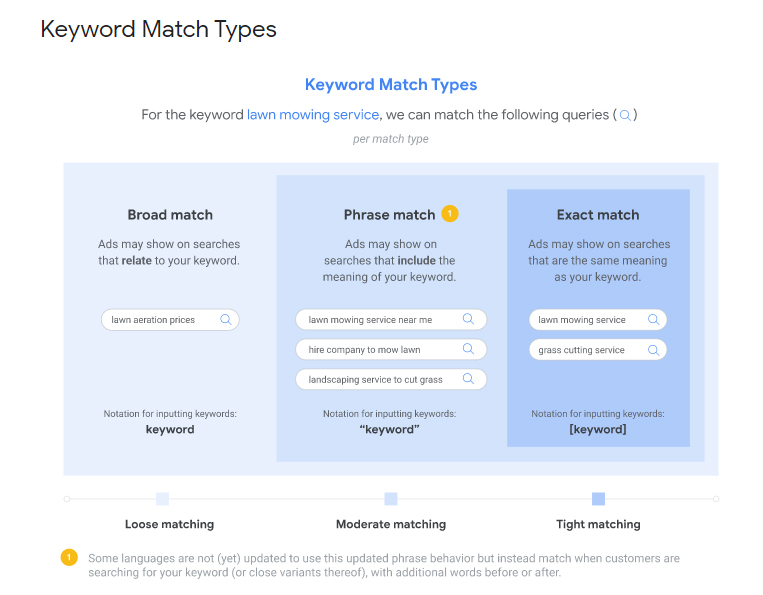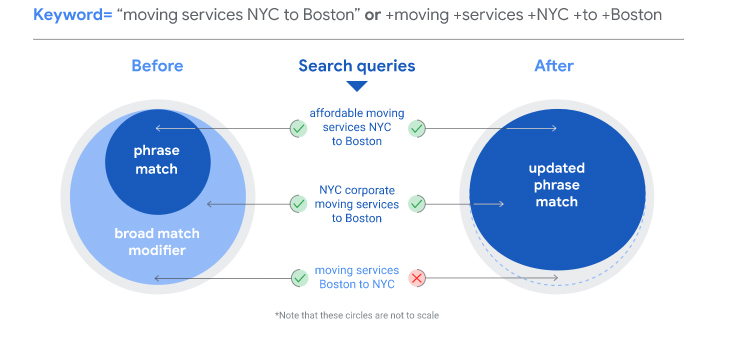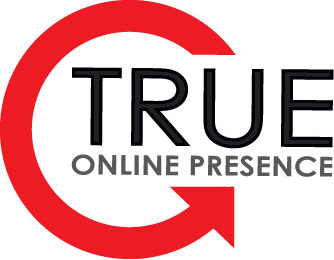Let us start with the basics of how Google Search ads work and then we will discuss the recent change and its importance.
When advertising using paid Google Search Ads, advertisers must enter a list of keywords that they wish to trigger their Search ads.
These Search ads, when clicked, will redirect users to the advertiser’s website. Ideally a page on the website that is related to the product or service that the user was searching for on Google.
Plain and simple.
Now these keywords that are used to trigger ads from appearing start to get a bit more confusing, although not really when you understand how they work.
There are (or at least were) four ‘types’ of keywords allowed that determine when paid ads are eligible to appear.
These keyword types are Exact, Phrase, Broad and Broad Match Modifier. Note, there is also negative keywords, but negative keywords are their own complete subject.
For now, we will look at these 4 match types, what they are and the change to the Broad Match Modifier.

Broad Match Keywords – Allows user searches (or close variants) that match a keyword or keywords related to your broad match keyword to trigger an ad to appear. This keyword type is used to maximize reach.
How to implement this match type: This is the most basic search type is also Google’s default. No punctuation needed to distinguish Broad Match type within the Google Search Ads console. Just enter the keyword and it is automatically a Broad Match Keyword type.
Example: For a broad match type, ‘Lawn Mowing Services’ will trigger your ad for search Lawn Mowing Services; however, it will also allow your ads to be eligible to appear for the simple search query Mowing Services (without the word Lawn) or even a more broad, yet related search such as ‘Lawn Aeration Price’. When using broad match there are going to be many more advertisers and how often ads appear will be reliant on your bid as well as your quality score. Note, that just because you are eligible, doesn’t mean your ads will always appear.
Phrase Match Keywords – Allows user searches (or close variants) that match a keyword phrase in the order of the phrase to trigger an ad. This keyword type is used as a balance between reach and precision.
How to implement this match type: Phrase match is used by adding quotes “ “ around the keyword phrase an advertiser would like to advertise.
Example: For the phrase match ‘Lawn Mowing Services’, only searches containing ‘Lawn Mowing Services’ or a close variant will trigger an ad to appear. ‘‘Lawn Mowing Services’ will trigger an ad as well as ‘Lawn Mowing Services Near Me’ and ‘Hiring a Lawn Mowing Service. Previously, a search for ‘Lawn Mowing and Leaf Blowing Services’ would NOT trigger an add to appear since the words Mowing and Services are separated by the word Leaf Blowing in the search. This is what is changing.
Exact Match Keywords – Allows only user searches (or close variants) that exactly match the keyword to trigger an ad. This keyword type is used for precision.
How to implement this match type: Exact match is used by adding brackets [ ] around the keyword an advertiser would like to advertise.
Example: For the exact match [Lawn Mowing Services], only a search for ‘Lawn Mowing Services’ or a close variant such as ‘Lawn Mowing Service’ will trigger an ad to be eligible to appear.
Broad Match Modifier Keywords – This match type is a hybrid between phrase and broad match. It allows keyword to trigger ads regardless of the order they appear in the user search, however, all words must be used within the search query. In addition, Broad Match Modifier keywords will trigger ads to appear only when the keywords match the ‘meaning’ of the search’. This keyword type is also used as a balance between reach and precision.
How to implement this match type: Broad match modifier is used by add a plus symbol + before each word or words.
Example: For the Broad Match Modifier Keyword +Lawn +Mowing +Services, both the search for ‘Lawn Mowing Services’ as well as the search for ‘Lawn Mowing and Leaf Blowing Services’ would trigger an ad to appear. Having the words in the broad match modifier interrupted does not matter as it previously did with the Phrase Match keyword.
What Is Changing and How It Works
Starting in February 2021, Google announced that phrase match keywords will start to incorporate the behaviors of the broad match modifier keywords.
No longer will phrase match keywords not trigger ads to appear based on the word order as long as all keywords are present. In addition, Google will begin to incorporate meaning into the searches.
One point that sometimes confuses those is what is meant by Google matching the meaning of the search with an advertiser’s keyword specially the Broad Match Modifier keyword type and soon to be Phrase Match keyword type.
To best exemplify this event, I’m using an example provided by Google when they announced the recent change.
For the broad match modifier +Moving +Services +NYC +To +Boston
An ad would be eligible to appear for ‘affordable moving services NYC to Boson’, but it would also appear for ‘affordable moving services Boston to NYC’ since word order does not matter in with broad match modifier.
The updated phrase match will not include the reverse direction where the search has a different completely meaning but will not include searches regardless of word order.
Still confused?
Below is a chart that demonstrates the change.

As you can see from the chart, the new updated phrase match will cover almost all of the searches previously covered by broad match modifier with the exception of now it can interpret meaning!
When Is It Changing?
The change went into effect February 2021. Starting in July of 2021, you will no longer be able to even create BMM keyword types.
Fortunately, you won’t need to make any changes to your account. You can still leave all of your broad match modifier keywords if you have them and they will start to also work interpreting the meaning.
However, going forward (starting at least in July), you will need to enter keyword types as phrase that you would have before added as broad match modifier.
Note, this change will not impact negative keywords in how they work.
Final Word
As a disclaimer, for most of my private clients I exclusively used a combination of exact and broad match modifier keywords match types. I found this combination worked well to provide relevant keyword traffic.
Google changes frequently their algorithm and their interfaces. Mostly minor changes, sometimes major changes; however regardless of the change it always seems to make those using Google ads cringe at the thought.
This change although a bit complicated to grasps seems to make the keyword system more efficient and will be easier to manage moving forward.
No longer do you need to distinguish between exact, phrase and broad match modifier. Now you will just need to use exact and phrase and I guess broad if you don’t care about driving relevant traffic (see examples above)!
Only time will tell, but my thought is this will be a positive change in driving relevant traffic.
Happy Marketing!
Andy Splichal
ABOUT THE AUTHOR
Andy Splichal is the founder and managing partner of True Online Presence, author of the Make Each Click Count book series, host of the Make Each Click Count podcast, founder of Make Each Click Count University and certified online marketing strategist with twenty plus years of experience helping companies increase their online presence and profitable revenues. In 2020, he was named to Best of Los Angeles Awards’ Most Fascinating 100 List. To find more information on Andy Splichal, visit www.trueonlinepresence.com or read The Full Story on his website or his blog, blog.trueonlinepresence.com.


